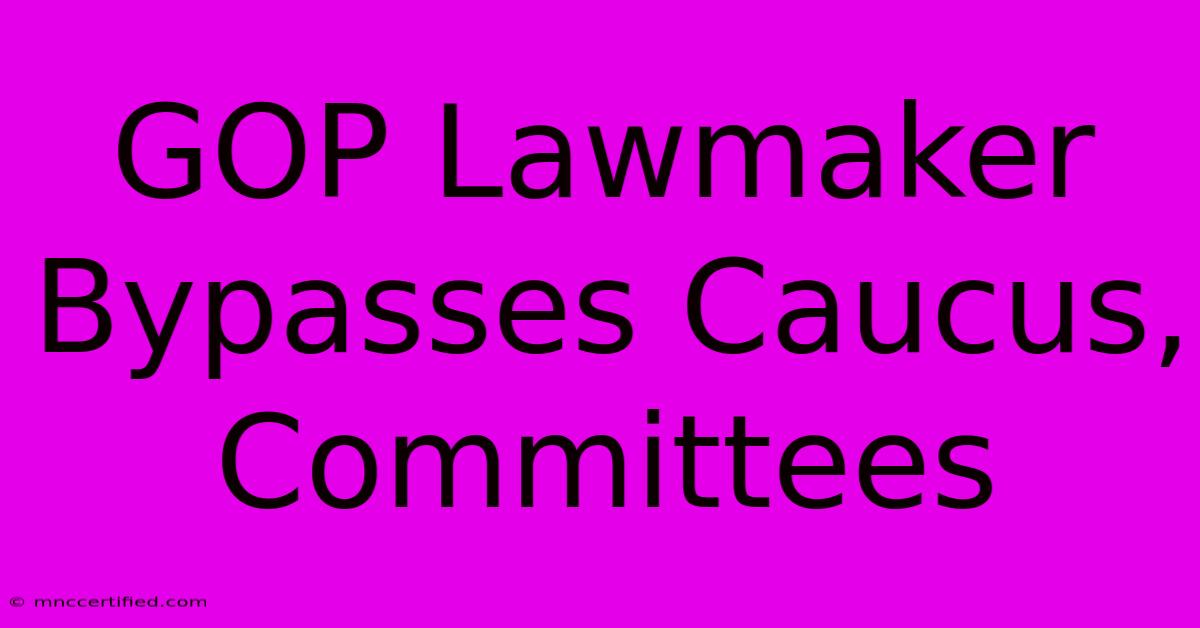GOP Lawmaker Bypasses Caucus, Committees

Table of Contents
GOP Lawmaker Bypasses Caucus, Committees: A Growing Trend in American Politics?
The recent actions of [Lawmaker's Name], a Republican lawmaker from [State], have sparked a debate about the increasing tendency of individual legislators to bypass established caucus and committee processes. This move, while not unprecedented, raises concerns about transparency, party unity, and the overall effectiveness of the legislative process. This article will delve into the specifics of [Lawmaker's Name]'s actions, explore the potential motivations behind such bypassing, and analyze the broader implications for American politics.
The Specifics of [Lawmaker's Name]'s Actions
[Lawmaker's Name] recently introduced [Bill Name or Type of Action], a [brief description of the legislation or action] without the usual process of vetting through the relevant committees and party caucus. This circumvention involved [Explain the specific actions taken to bypass the process. E.g., introducing the bill directly to the floor, lobbying individual legislators directly, using social media to garner public support, etc.]. This action deviates significantly from the established norms within the [State] Republican Party and the state legislature as a whole.
Why the Bypass? Potential Motivations
Several factors could explain [Lawmaker's Name]'s decision to bypass established procedures. These include:
-
Frustration with the Legislative Process: The lawmaker may have felt that the standard committee process was too slow, inefficient, or prone to influence from opposing factions. Deadlines, internal disagreements, and procedural hurdles could have fueled this frustration.
-
Differing Political Ideology: [Lawmaker's Name]'s proposed legislation might be significantly at odds with the prevailing views within the party caucus or relevant committees. Bypassing the process could be a strategic move to circumvent potential opposition and secure passage.
-
Political Opportunism: The action might be a calculated attempt to garner public attention and boost the lawmaker's profile, potentially appealing to a specific voter base or preparing for a future election. Public pressure could then be used to push the legislation forward.
-
Lack of Support within the Party: It’s possible that the lawmaker lacks sufficient support within their own party to advance the legislation through normal channels. A direct approach might be seen as a last resort to get the bill considered.
The Broader Implications: Erosion of Trust and Efficiency?
This incident highlights a potential erosion of trust within the GOP and raises serious questions about legislative efficiency. The bypassing of established processes undermines the collaborative nature of lawmaking, potentially fostering resentment and division.
Impact on Party Unity and Governance
By circumventing the caucus and committees, [Lawmaker's Name] risks fracturing party unity and weakening the party's ability to govern effectively. This can lead to a less cohesive legislative agenda and difficulties in negotiating compromises.
Transparency Concerns
The actions raise concerns about transparency. The established legislative process, with its committees and public hearings, provides opportunities for public scrutiny and debate. Bypassing these processes limits transparency and public input.
Future Trends and the Need for Reform
This incident is not isolated. Similar instances have been observed in other state legislatures and even at the national level. This trend might suggest a need for reform within political parties to address concerns about efficiency and ensure that all voices are heard. The question remains whether the current system is equipped to handle the increasingly individualized and polarized nature of modern politics.
Conclusion: A Wake-Up Call for Legislative Reform?
[Lawmaker's Name]'s actions serve as a case study of the evolving dynamics within American politics. While the specific motivations remain open to interpretation, the consequences of bypassing established processes are clear: decreased transparency, potential damage to party unity, and questions about the effectiveness of the legislative process. This incident could potentially spark crucial conversations about reforming legislative procedures to enhance collaboration, improve transparency, and ensure that the voices of all legislators are heard and considered. Further analysis and debate are needed to determine the best path forward to address these issues.

Thank you for visiting our website wich cover about GOP Lawmaker Bypasses Caucus, Committees. We hope the information provided has been useful to you. Feel free to contact us if you have any questions or need further assistance. See you next time and dont miss to bookmark.
Featured Posts
-
Mishal Husains Today Programme Farewell
Dec 18, 2024
-
Darts Star Menzies Loses Cries
Dec 18, 2024
-
Pakistan Beats South Africa By 3
Dec 18, 2024
-
Sam Fender Cancels Glasgow Newcastle Shows
Dec 18, 2024
-
Sam Fender Cancels Newcastle Show
Dec 18, 2024